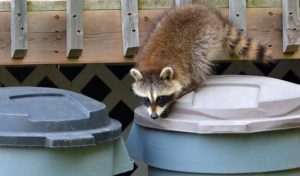Wildlife can be very problematic for a homeowners association. But should boards even deal with wild animals in HOA communities?
Common Wild Animals in HOA Communities
It is not unheard of for wild animals to visit an HOA neighborhood. This is particularly common for communities in mountainous areas, forests, or near nature preserves. And depending on the environment, there are several wild animals an association and its homeowners may encounter. But, beautiful and majestic as they are, these animals can bring all sorts of problems.
Deer, for instance, can transmit ticks and cause Lyme disease. Ducks, geese, and other fowl, while not an issue in small numbers, can be pretty territorial when challenged. They also tend to be attracted to communities with water features such as pools and ponds. And coyotes can be very aggressive toward people and have been known to target pets.
How to Deal With Wildlife in HOAs
 Wild animals usually stay in their habitat for the most part, but they can wander into your community without warning. Sometimes, they’re just lost or follow another animal into the neighborhood.
Wild animals usually stay in their habitat for the most part, but they can wander into your community without warning. Sometimes, they’re just lost or follow another animal into the neighborhood.
Other times, they enter the community in search of food. When they find it — either in the form of scattered trash or residents feeding them — they become accustomed to the food source and continually return. Over time, these animals will stop naturally fearing humans and start becoming aggressive.
It is understandable for homeowners to become concerned when there’s a growing population of wild animals in the community. Even if these animals don’t pose an immediate threat, owners will still worry about their safety. Often, these owners will turn to their HOA for protection or assistance. But should an HOA board even take action?
Many States Already Have Laws in Place
Most of the time, an HOA wild animal problem stems from food availability. Stray animals will rummage through garbage bins and approach residents for scraps. When they get what they want, these animals will be conditioned to return for more. After all, it’s easy pickings.
There are many states and cities, though, that already prohibit people from feeding wild animals. Check your local laws to check if any such ordinances exist. If they do, your HOA can remind residents that feeding wildlife is illegal, significantly minimizing the problem.
Relocation or Removal of Wild Animals in HOA
When wild animals become so pervasive, many owners want to relocate or remove them from the area. But, depending on state or local laws, relocation or removal may not be permitted.
For instance, the Department of Fish and Game in California does not allow you to move mountain lions because relocation could cause lethal conflicts with other mountain lions in the new area. The department also doesn’t allow you to relocate a coyote because it merely passes the problem to a different community.
In terms of removal, it also depends on the state or local government. In California, owners can kill wild animals if they threaten people or prey on pets or livestock. However, owners will need to secure a depredation permit first. Hunting may also solve the problem but it still depends on local ordinances.
Rely on Animal Control
The good news is that an HOA board usually does not have to rely on its own resources to deal with wild animals. If a community has a wild animal problem, it can call local animal control to take care of the issue. Even if there is only a single sighting, if it poses a threat to the residents, animal control can step in to address the problem.
Installing Fences and Imposing Rules
At first glance, it seems like installing fences and imposing strict rules would allow the HOA to deal with the wild animal issue. But, these actions can put the association in a precarious position.
Fences or other barriers would keep wild animals away from the neighborhood. Rules concerning trash bins and feeding strays can also restrict their food source. But, these actions can open the association to potential liability. If the association installs a haphazard fence, an owner suffering from wild animal injury may sue the HOA for not exercising great care. If the association fails to enforce a rule that results in a similar injury, an owner may argue that the HOA’s failure to enforce the rule directly led to the damage.
By installing fences and imposing rules, the HOA might assume a responsibility it does not inherently carry. Even with the highest level of care, an association may still be at risk of liability. Homeowners will always find someone to blame, and it’s easy to point the finger at the HOA. In the same way, lawyers will actively look for and exploit loopholes in the HOA’s governing documents in favor of their clients.
To mitigate the liability risk, an association should amend its documents to eliminate any obligation or liability related to wild animals explicitly. Instead, the documents should indicate the owners’ responsibility to protect themselves against these wild animals.
Send Safety Reminders to Residents
In lieu of imposing and enforcing rules, an HOA board may be better off sending safety reminders to residents. Boards can include these reminders in newsletters or e-newsletters, and these reminders can include but are not necessarily limited to the following:
 Avoid contact with wildlife
Avoid contact with wildlife- Don’t feed wild animals
- Use tamper-proof trash bins
- Take out the trash only at designated schedules
- Don’t leave pets unattended
- Keep pets indoors at night
- Block off gardens, especially fruit and vegetable gardens
If a resident spots a wild animal, they should report it to animal control. Moreover, the reminders should clearly indicate that the association is not responsible for the safety of residents.
When In Doubt
Dealing with wild animals in HOA communities can be challenging. But, associations should be aware of the potential liability risks that come with the territory. When in doubt, it is always best to call animal control and seek legal counsel.
Elite Management Services provides legal assistance in addition to various other services. Call us today at (855) 238-8488 or contact us online for a free proposal!
RELATED ARTICLES:
- HOA Security Guards: Do Homeowners Pay For Them? How Do They Improve Security?
- A Guide For HOA Security Camera Installations And Usage
- HOA Rules and Regulations: What Homeowners Should Know







